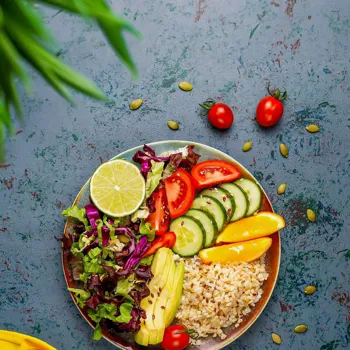Unveiling the Power of Calcium in Your Indian Diet: Explore its vital role beyond bones. Read on to discover its significance and sources
In the bustling landscape of Indian cuisine, where spices dance
and flavors explode, it's easy to overlook the silent, yet mighty nutrient working tirelessly behind the scenes: calcium.

This mineral, often associated with strong bones, plays a far more intricate role in our overall well-being than many realize. From supporting muscle function to nerve transmission, calcium is an unsung hero worthy of our attention, especially within the context of the traditional Indian diet.
Let's delve into why calcium is essential for health, and how to ensure you're getting enough of this vital nutrient.
Calcium vital for body functions, like an orchestra conductor
Calcium is more than just the foundation for our skeletal structure; it's a key player in numerous bodily functions. Think of it as the conductor of an orchestra, ensuring that different parts of the body are working in harmony.
For instance, calcium is vital for muscle contraction, allowing us to move, walk, and perform everyday activities. It's involved in nerve transmission, enabling our brain to communicate effectively with the rest of our body.
Furthermore, calcium aids in blood clotting, a crucial process for wound healing. Without sufficient calcium, these fundamental processes can become impaired, impacting daily life.
Diverse vegetarian sources of calcium in Indian diet
Now, let's talk about food sources. Calcium is not just about dairy products; there are many vegetarian sources available in the Indian diet. Leafy green vegetables like spinach (palak) and kale (saag) are packed with calcium.
While the calcium in spinach might not be as readily absorbed as that from dairy, it still contributes significantly to your daily intake. Beans and lentils (dal), staples in many Indian homes, also offer a good dose of calcium.
Fortified plant-based milk alternatives, like soya milk or almond milk, are excellent options for those who are lactose intolerant or prefer a vegan diet. Tofu, a popular soy-based food, is another calcium-rich source.
Even certain seeds, like sesame seeds (til), can boost your calcium intake considerably.
Calcium absorption is complex, affected by vit D, sodium, & vit C
It's important to note that absorption of calcium is not a simple process. Various factors can influence how well our bodies absorb calcium from the food we consume. Vitamin D is crucial for calcium absorption. Without sufficient vitamin D, our bodies struggle to utilize the calcium we ingest.
So, make sure you're getting enough sunlight or consider taking a vitamin D supplement. Other factors that can hinder calcium absorption include high sodium intake and certain medical conditions. Conversely, consuming calcium-rich foods with meals containing vitamin C can enhance absorption.
Calcium deficiencies lead to health issues like osteoporosis
Now, let's address the issue of deficiencies. In some cases, due to inadequate dietary intake or absorption problems, people may experience calcium deficiencies.
This can lead to several health problems, including osteoporosis, a condition characterized by weakened bones and an increased risk of fractures. Other symptoms of calcium deficiency can include muscle cramps, fatigue, and numbness or tingling in the hands and feet.
If you suspect you might be deficient in calcium, it's best to consult with a doctor or registered dietitian who can assess your individual needs and recommend appropriate treatment options.
Incorporate calcium easily into daily diet for strong bones
Incorporating calcium into your daily diet doesn't have to be a chore. There are many delicious and easy ways to boost your intake. For example, you can add chopped spinach to your favorite dal or stir-fry. A handful of almonds or sesame seeds can make a nutritious snack.
Start your day with a glass of fortified plant-based milk. By making small, conscious choices, you can ensure you're getting enough calcium to support your overall health and well-being.
Remember, calcium is not just for kids; it's essential for people of all ages, from childhood to old age, to maintain strong bones and enjoy a healthy, active life.
Calcium in postmenopausal women, with vitamin D for deficiency
Calcium is used in medicines. it is often given for postmenopausal women. It is found in mineral supplements. It is prescribed with vitamin D for patients who have deficiency. It is important to supplement your diet when you are deficient.
Old people prevent bone decay by consuming calcium-rich foods
Calcium is used by old people to prevent bone decay. When you grow old, your bones become fragile because of reduced calcium. It is important to eat food which has high calcium.
Eating calcium-rich foods for strong bones
It is good to include calcium to keep bones strong and healthy. Green leafy vegetatables are good source of calcium. You can also eat beans and lentils for more calcium.
Calcium obtained from food or medicine, essential for health
Calcium can be obtained with food we eat. It also comes in medicine form. When calcium is low, medicine is prescribed for taking this mineral. Your diet is crucial when it comes to calcium.
Importance of diet for longevity and health
You have to consider your diet and overall well being. People need to take care of their health. You need to make good choices for living longer.
Calcium is vital for strong bones, eat calcium-rich foods
Calcium is important for living a better and healthy life. You have to eat food which contains calcium. This mineral makes strong bones.
AI Generated Content. Glance/InMobi shall have no liability for the content














